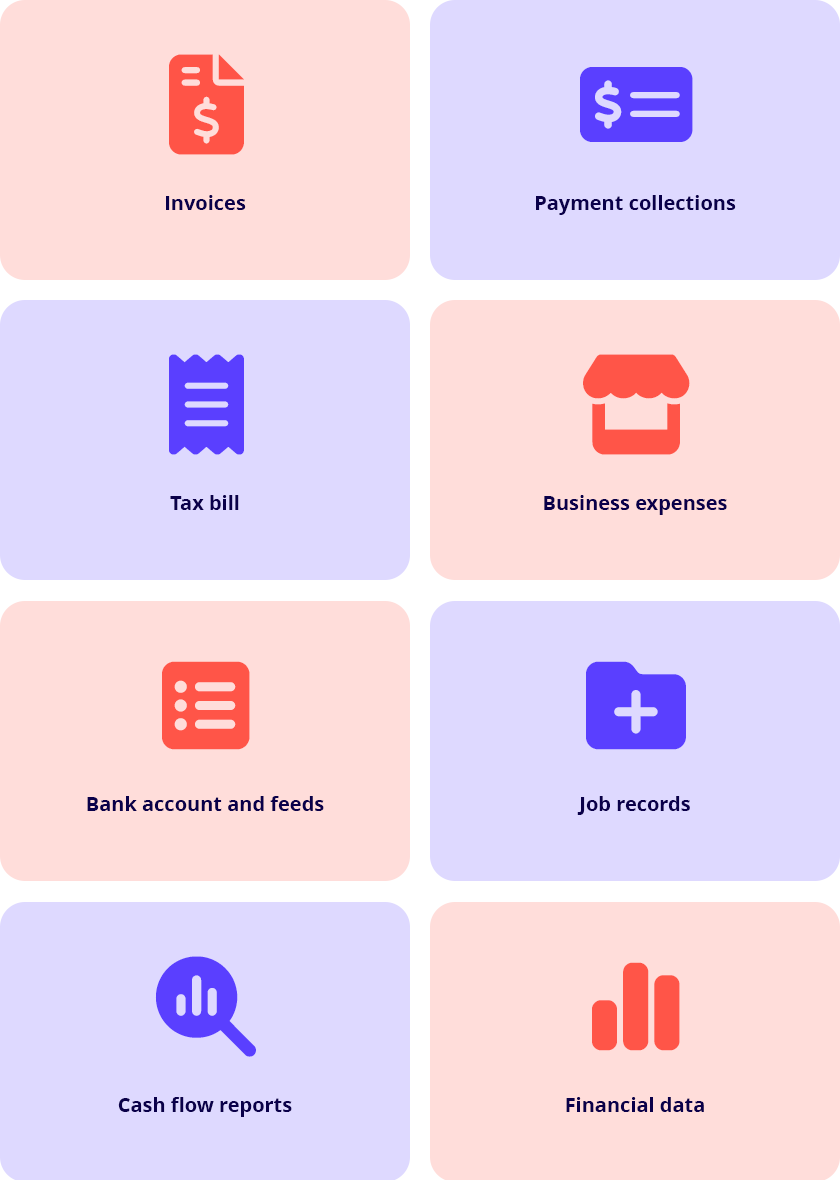You’ve started your freelance small business journey but are not sure where to begin with freelance bookkeeping? Don’t worry, with accounting software and a little know-how it’s not such a momentous task.
In this article you will learn:
The importance of freelance bookkeeping
How does freelance bookkeeping work
The importance of freelance bookkeeping
When you start out freelancing for the first time, it’s incredibly important to start your bookkeeping process immediately. This involves having good accounting software for freelancers, and an initial visit to a bookkeeper to get you on track.
When you freelance without a bookkeeper, you’ll have to manage your own:
- ability to send invoices
- payment collections
- tax bill
- business expenses
- bank account and bank feeds
- job records
- cash flow reports
- financial data
These aspects are part and parcel to the gig and that’s exactly why bookkeeping for freelancers is an unavoidable necessity. You’re on your own, so you’ll need to get your head around basic accounting processes to stay compliant with the Australian Tax Office and manage your business finances and cash flow effectively.

How does freelance bookkeeping work?
Bookkeeping for freelancers is all about organisation, professional advice and using the right freelance bookkeeping or accounting software.
Organisation
From the get-go, it’s imperative to stay organised. Keeping track of your own outstanding invoices, business transactions, finances and operations, is all down to you. Nobody else will do it for you.
A freelancer needs to:
- record, send and collect invoices
- take accurate notes on jobs completed, jobs outstanding, hours worked, and income received
- manage their own taxes and ATO compliance
- tend to accounts receivable
- undertake cash flow reporting
- record all their expenses and retain receipts.
The best way to go about this is not in Excel, or heaven forbid paper records. The best bookkeeping software for freelancers will be a centralised, cloud-based accounting app like Reckon One to keep your freelance business organised and your finances visible.
Professional bookkeeping advice
The best way to start your freelance bookkeeping mission is to consult a professional. Make an appointment with an experienced bookkeeper so they can assess your business model.
A good bookkeeper will ensure you’re not only set up for ATO compliance, but they’ll also assess how you can minimise your tax time bill, make wise decisions when it comes to expenses, assess your cashflow potential and tackle risk mitigation.
In many cases, you can start out with a single appointment to get you rolling in the right direction, however, pursuing a trusted and ongoing relationship with a bookkeeper or accountant will see your business understood that much better and the advice you receive will be more targeted and salient.
Compliance
First, you need to understand how the ATO defines what you do – a freelancer is a sole trader for tax purposes. When applying for an ABN, processing income tax and reporting, this is your designation.
In terms of compliance, your responsibilities as a freelancer to the ATO are as follows:
- You’ll be using your individual tax file number (TFN) when you lodge a tax return.
- There’s no specific tax return process for a sole trader, you need to report your earnings under ‘business items’ to report your freelance income and expenses.
- You’ll need an ABN to manage all your freelance activity.
- If you’re earning over $75,000 per year, you’re required to register for GST. You may also choose to register for GST regardless of income.
- Your tax rate is set at the same rate as an individual tax-payer.
- Importantly, you need to put aside money to pay your income tax. You can do this yearly or, more efficiently use PAYG to pay tax quarterly, which allows for better management and avoids large tax bills.
- If you pay into your own super account, you can claim a deduction.
Freelance bookkeeping software
The most practical step you can take when approaching bookkeeping for your freelance work is to immediately sign up for cloud accounting software. Why? Because:
- it takes all the leg work out of your day-to-day operations
- it provides full visibility of your cashflow, incomings and expenses
- it can be used to issue invoices and view accounts receivable
- it can help pay any staff you may have
- will report on cashflow
- will record expenses
- will monitor bank transactions
- data can be easily provided to your bookkeeper for quick and accurate compliance and tax returns.
Bookkeeping tips for freelancers
So now we’ve laid down the nuts and bolts of how bookkeeping for freelancers works, what are the top takeaways and tips you should keep front of mind?
- Keep your tax payments in a separate account so you never fall short or get tempted to dip into your income tax funds.
- Use separate bank accounts and cards for all earnings and expenses – teasing out professional finances from personal finances is an easily avoidable nightmare come tax season.
- Get professional advice from a bookkeeper or accountant before you set everything up.
- Don’t try to attempt manual processes – this is why automated bookkeeping software exists.
- Record every single expense and receipt digitally. Paper receipts and invoices are dead, insecure and inefficient. Store them directly in your accounting software for the best results.
- Run regular accounts receivable reports to keep on top of overdue invoices if you’re invoicing clients.
- Keep an eye on your threshold to know when to register for GST. You can also voluntarily register for GST before you reach the threshold.
At the end of the day, with proper organisation, advice, accounting software, and research, bookkeeping for freelancers isn’t so daunting, regardless of your background or vocation.
Check out our Reckon One accounting software, perfect for freelancers who want to focus on their passion and do the least amount of bookkeeping work possible.

